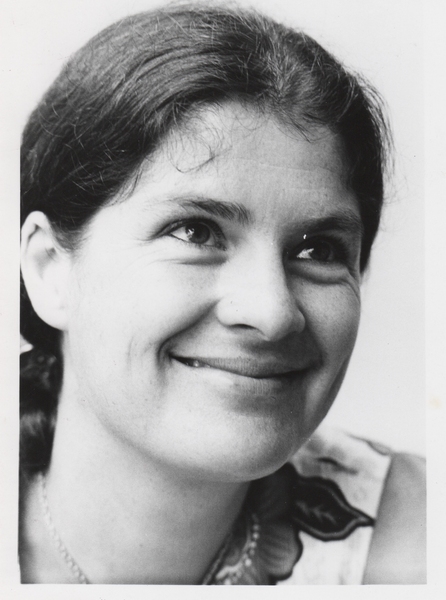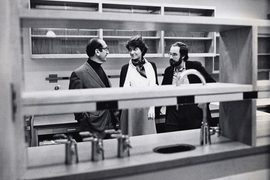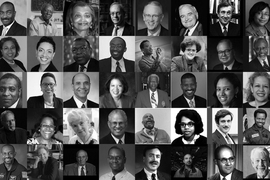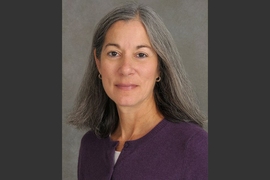Mary Rowe, former MIT ombudsperson, has donated professional papers to the MIT Libraries’ department of Distinctive Collections as part of the Women@MIT archival initiative, which highlights the contributions of women at the Institute by acquiring, preserving, and making accessible their personal archives. Rowe is a conflict management specialist whose work contributed to MIT having one of the world’s first anti-harassment policies and one of the first organizational ombuds offices. Important portions of her collection have now been digitized by the libraries, making the history of Rowe’s groundbreaking work more accessible.
“We’re thrilled to be able to make this collection available,” says Alex McGee, interim head of public services and Women@MIT project archivist for Distinctive Collections at MIT Libraries. “Not only will it be a valuable resource for any researcher interested in issues of conflict management, discrimination, gender equity, sexual harassment, and a systems approach to all workplace issues, but it also sheds light on a pivotal period for women at MIT and the work involved in documenting and improving conditions for them.”
Rowe served as special assistant to the president and ombudsperson for almost 42 years as a designated neutral party available to every member of the MIT community. President Jerome Wiesner and then-Chancellor Paul Gray designed the office for her to be an impartial, confidential resource; she would keep no case records for MIT and not be an office of “notice” at the Institute. Rowe was to be an independent resource reporting only to the president and chancellor, with access, if needed, to the MIT Corporation. She was to practice “informally” — meaning with no ordinary management decision-making authority or authority to provide redress — and no one could be required to see her.
In her four-plus decades as an ombuds, Rowe received more than 20,000 constituent visits (with concerns and good ideas) and worked with nearly 100 small and large affinity groups dealing with substantial workplace issues. She worked with each constituent to try to develop options for their own choice in dealing with their concerns. With permission, and upon request, she often helped to bring issues to the attention of Institute decision-makers.
Rowe’s position was called “special assistant for women and work” when she started at MIT in 1973, when she reported directly to President Wiesner and Chancellor Gray. She was joined in 1974 by Clarence G. Williams as special assistant for minority affairs. From the beginning, they each saw everyone who came to see them, about any workplace issue. They then formally became the first ombudspersons (or ombuds) at MIT when then-President Gray established the Ombuds Office in 1980. The Ombuds Office is a confidential and independent resource for all members of the MIT community to constructively manage concerns and conflicts related to their experience at the Institute.
Rowe’s work has had a profound impact on MIT — helping to shape the Institute’s policies around harassment, discrimination, conflicts of interest, and other research integrity issues — as well as on the ombuds profession globally. She helped to define the organizational ombuds role and advance broadly accepted standards of practice. An adjunct professor of negotiation and management at MIT Sloan since 1985, Rowe built on MIT’s deep contributions to systems theory, coining the term “zero-barrier office” to illuminate the unusual role of ombuds in a conflict management system. She also coined the terms “micro-inequities” and “micro-affirmations” in 1973, building on influential research by Chester M. Pierce about microaggressions. Rowe built on the foundational work of Robert B. McKersie and Richard E. Walton to develop a course on negotiation and conflict management at the MIT Sloan School of Management in the 1980s that was among the first of its kind.
“It takes a village to support an ombuds office,” says Rowe. “The ombuds office that started at MIT and gave rise to two archival collections started from a vision — and the values — of affinity groups at MIT and presidents Jerome Wiesner and Paul Gray. We were guided and inspired, day by day, by the constant effort of students, staff, faculty, postdocs, alums, and spouses to exemplify ‘mind, hand, and heart’ and to share concerns and good ideas. I am deeply grateful to Distinctive Collections for their inspiring initiatives to acquire, preserve, and make accessible more glimpses into the lives and work of those who seek to make all humans more visible.”
Rowe’s ombuds papers are closely tied to MIT administrative records from her tenure, also held by Distinctive Collections. The newly digitized materials include items identified by Rowe as integral to the ombuds profession (by standards of practice, organizational ombuds keep no case records). The collection itself, comprising 38 boxes of material, includes some of Rowe’s publications as well as records of several ombuds associations, which show the evolving nature of the profession and highlight workplace issues that emerged at specific times. The materials document practices of organizational ombuds in many types of organizations, including government, academic, corporate, multinational, international, and nonprofit organizations.
Rowe’s papers, digitized with the support of Jean-Jacques Degroof SM ’93, PhD ’02, were accessioned as part of the Women@MIT archival initiative, which seeks to add the records of women faculty, staff, students, and alumnae to the historic record by collecting, preserving, and sharing their life and work with MIT and global audiences. Extending from this initiative, Distinctive Collections is also making efforts to acquire, preserve, and make accessible the papers of gender non-binary and non-conforming individuals at MIT to help share their stories and contributions.











